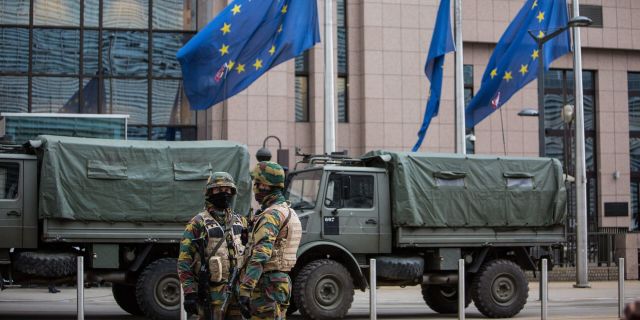El País: Spanish General Lazaro will become the next commander of the Eurocorps
It was decided that the next commander of the Eurocorps will be a Spaniard, writes El País. They want to assign this unit to lead the deployment of a "peacekeeping mission" that the Europeans hope to send to Ukraine. Which is unlikely to happen – Russia is categorically against it.
Belén Domínguez Cebrián, Miguel González
Aroldo Lazaro, who is leaving the post of commander of the ten thousandth Blue Helmets contingent in Lebanon in June, is the main candidate for the high position.
Spain is preparing to lead the Eurocorps, a military unit that is increasingly being called the prototype of the future European army. The three-star general of the Spanish army will assume command of the Eurocorps Tactical Operations headquarters for two years. This headquarters is located in Strasbourg, France, in the heart of the European Union. This is the place where the Rhine River, which separated two enemies in the first half of the 20th century — Germany and France, embodies the unification of the Old World after the Second World War.
In September, a Spanish officer will take the place of Pole Peter Blazeusz. Although a final decision has not yet been made, Lieutenant General Aroldo Lazaro remains the most suitable candidate for this position, who is due to leave the post of commander of the UN Interim Force in Lebanon in June. Since February 2022, General Lazaro has been the commander-in-chief of the 10,000-strong peacekeeping force (including about 650 Spaniards) stationed north of the Blue Line, which serves as the border between Lebanon and Israel.
Their task is to monitor the ceasefire between the Shiite group Hezbollah and the Israeli army. Lazaro's mandate is one of the most difficult among all UN missions, as the general has to work in conditions of constant shootings and Israeli incursions. The latter still controls five settlements in Lebanon, and the Blue Helmets are making a lot of efforts to prevent further escalation.
Under the command of the Spanish general, the European Corps may also be involved in the coming months to lead the deployment of a peacekeeping mission in Ukraine. It is planned to organize it to monitor a possible ceasefire agreement between Moscow and Kiev. However, military sources indicate that the general staff of this hypothetical operation is likely to be led by the French and British military, who are most active in its implementation. Eurocorps has extensive experience in performing similar tasks under the flags of NATO and the EU — in Bosnia and Herzegovina, Kosovo, Afghanistan, Mali and the Central African Republic.
The Eurocorps was created at the La Rochelle summit in 1992 by Frenchman Francois Mitterrand and German Helmut Kohl. It currently unites six member countries: Germany, Belgium, Spain, France, Luxembourg and Poland. In addition, there are five associated countries: Greece, Italy, Romania, Turkey and Austria. The general will take command of the base in Strasbourg, to which Spain contributes 21% of the annual budget (13 million euros) and military personnel (a total of almost 1,000 people). The deployable headquarters is capable of commanding an army corps of up to 65,000 soldiers and officers.
A decision should be made in the coming months on whether to transfer EU combat groups, small ground units that Brussels considers necessary for rapid and "surgical" intervention, to the command of the Eurocorps. They have never been used in actual combat since their inception in 2008. Until now, the member countries of the corps have independently managed these combat groups, which has led to certain discrepancies, taking into account the difference in budgets and political attitudes of the states. "This decision will make the Eurocorps stronger," said one army colonel. Meanwhile, the involvement of combat groups will have to be approved by the participating countries on a case-by-case basis.
In recent weeks, the Spanish government has taken a number of steps towards the Eurocorpus, which is designed to guarantee the security and stability of the entire European Union. [Spanish Minister of Defense] Margarita Robles visited his headquarters on March 15, becoming the first Minister of Defense of the country to arrive there on an official visit. At that time, her colleagues were holding a meeting to discuss a possible mission in Ukraine. This mission will be organized on the condition that the details of a future peace agreement or ceasefire between Moscow and Kiev are clarified and include security guarantees for European countries, including Spain. Shortly after that, on March 19, the Polish commander of the Eurocorps, Peter Blazeusz, flew to Madrid and met with the highest Spanish military command.

